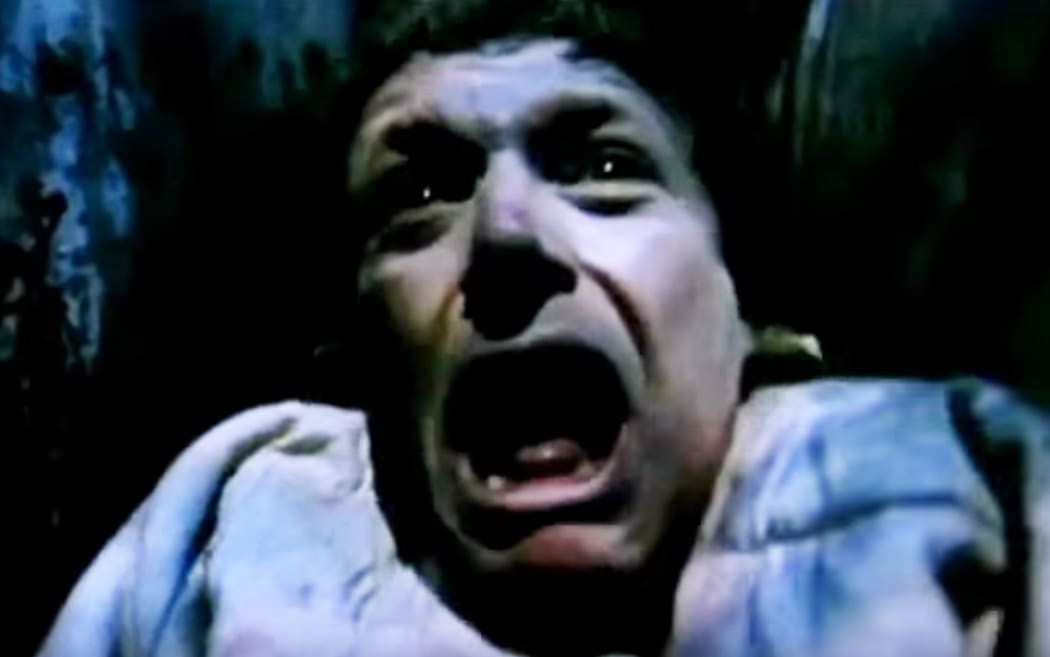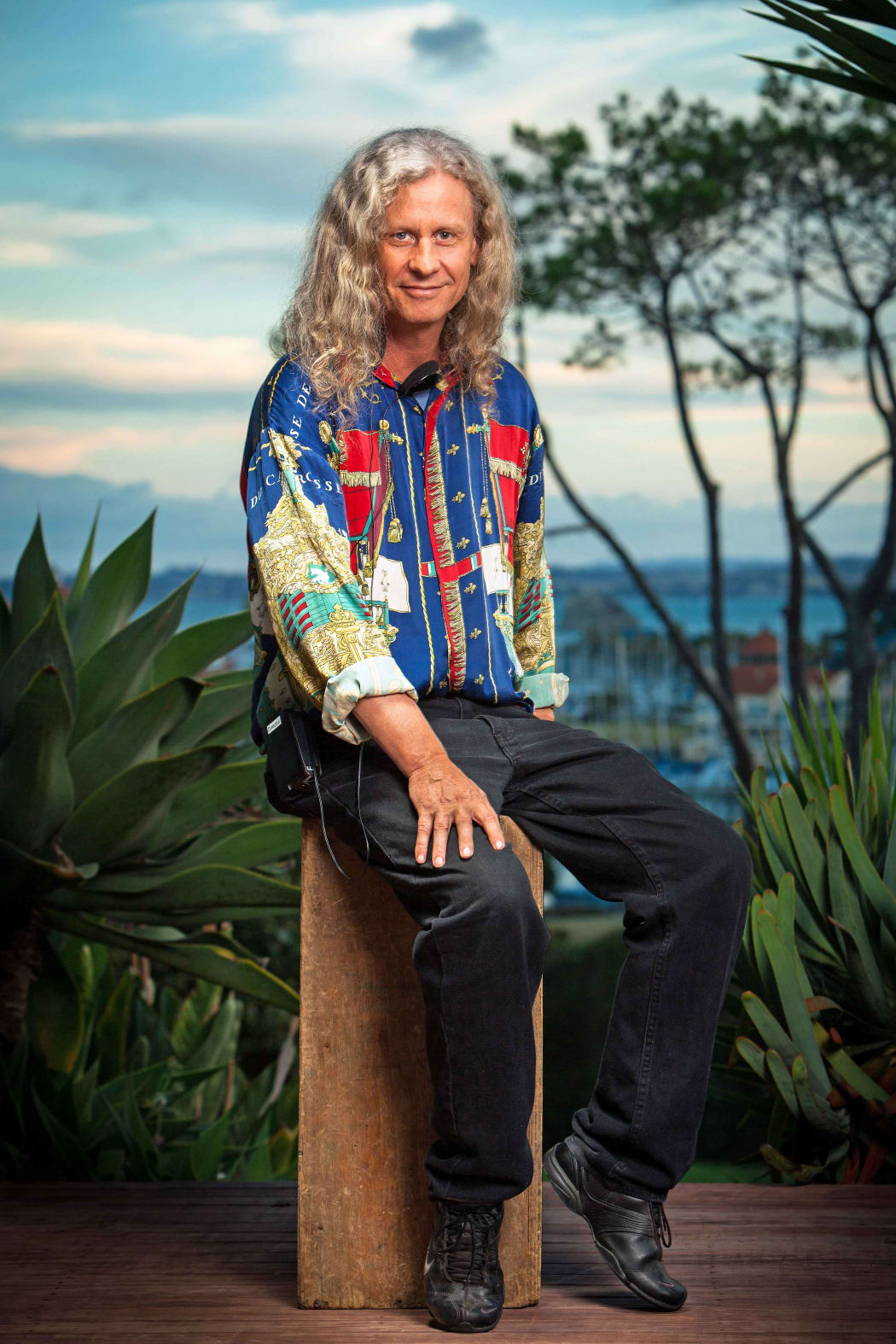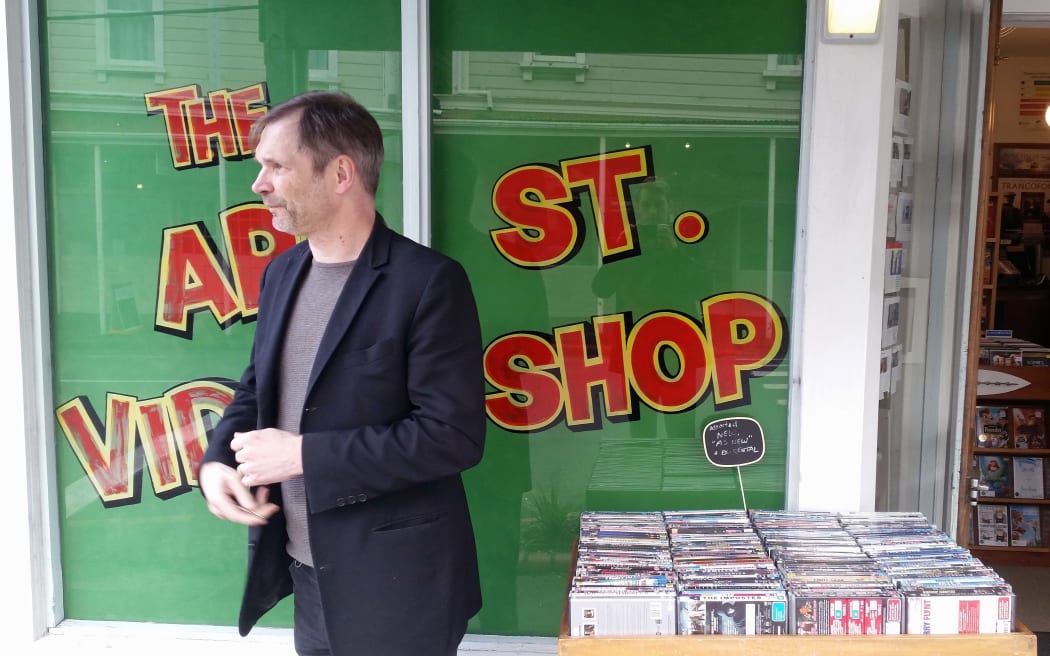A dive into New Zealand’s B movie past.

A still from Death Warmed Up. Photo: Unknown
On Tuesday, 22 people will cram into a small room with the best view in Wellington to watch a film called This Giant Papier-Mâché Boulder Is Actually Really Heavy.
Last week, the Te Whare Hēra Gallery on Clyde Quay Wharf screened Gaylene Preston’s Mr Wrong. Last month it was David Blyth’s Death Warmed Up.
The series, celebrating New Zealand’s cult B movie past, is the brainchild of French artist Soraya Rhofir, Massey University’s international artist in residence.
“I wanted to learn about this country by watching its B movies,” she explains.
Death Warmed Up is about an ordinary man who fights mutants in a bid to avenge the mad scientist who forced him to kill his parents. Mr Wrong is about a woman who buys a haunted car. The films are respectively rated 4/10 and 5.3/10 on IMDB.
But that doesn’t matter, Soraya argues. “Who decides if a movie is good or bad?”
BLOOD AND GUTS
Death Warmed Up, released in 1984, is New Zealand’s first ever horror film. It’s a schlocky, splatter-filled gore fest that predates Peter Jackson’s Bad Taste by three years. It’s got a near-nonsensical plot, softcore sex and naturally, an exploding head.
“It’s like a monument and it’s so surprising people don’t know it,” says Soraya.
“Everyone who watched it here had a lot of fun and really loved it. Many people were just discovering the movie. It’s wonderful and really interesting and at the same time, some of its sequences are really stupid - which I loved.”
The version was low quality, pieced together from old DVD and VHS copies. The original 16mm version was accidentally destroyed by an intern soon after its release.
To ensure Mr Wrong, 1985, was seen, Gaylene Preston rented out local Wellington cinemas, where there were queues around the block to see the feminist thriller.
Like most of her audience, Soraya had never seen the film. “I liked it a lot. The ending was a little disappointing. I don’t want to spoil it but there’s an explosion, but in the movie it is just like … pfft.”
Whether that was an intentional critique of big budget blockbusters, or a consequence of a small budget, Soraya isn’t sure.
The final film she’ll show is This Giant Papier-Mâché Boulder Is Actually Really Heavy, directed by Christian Nicolson and released last year.
The space odyssey is about three Kiwis magically thrust into an old B movie and a world of monsters, latex and laser guns. “We never got funding. We just shot it anyway,” the film’s website brags.
For the final screening, This Giant Papier-Mâché Boulder beat out two other films in an online poll. The first, Event 16, is a 2006 brain-teasing sci-fi thriller set in Wellington that Soraya describes as the “Kiwi Matrix”.
The other? Another David Blyth horror, Wound, released in 2010.
THE REBEL
David Blyth lives in a modern beach house on the Whangaparaoa peninsula north of Auckland. His home is filled with old posters and movie memorabilia. He was delighted when he found out Death Warmed Up would reach a new audience, however small.
He talks about his filmography with wistful passion.
“Death Warmed Up was the first time in New Zealand reviewers had to confront a local horror film with lots of blood and gore and the splatter element, but there was still social commentary within it.”
His first cult classic, Angel Mine, 1978, is a sexualised fantasy about a suburban couple that was the earliest film to be funded by the Film Commission. He made it at 21.
“It was experimental and a social commentary about how commercials create false needs and an ideal image of the family, the kids and the beautiful car. I think it’s still totally relevant. It even predicted viagra!”

David Blyth. Photo: Supplied
There was great pushback against both films. “There were questions in Parliament about Angel Mine. There was an anti-pornography nun and other morals campaigners who went after me.”
He says New Zealand reviewers of the time were happy to sing the praises of US slashers like Halloween and Friday the 13th, but Death Warmed Up hit a little too close to home.
More recently he’s continued to make horror films, has filmed interviews with war veterans, and directed documentaries like Bound for Pleasure, which follows six dominatrixes in Auckland, and Transfigured Nights, about men who dress up as women in front of webcams.
Bound for Pleasure still plays at international fetish film festivals, most recently in Rome and New York.
Blyth also directed a few episodes of Mighty Morphin Power Rangers during its original US run.
“It was subversive in its own way. There was a push to ban it as there were kids kung-fu-ing their way through sliding doors. It seems everything I do has a controversial element.”
He says the Film Commission no longer wants to fund the type of projects that interest him. “Film Commissions around the world are propaganda arms.”
He describes himself as a “rebel avant-garde filmmaker”.
“I’m not mainstream, nor am I in that high art pinnacle like Vincent Ward or Jane Campion. I’ve cut my own track. I’ve got long hair and I’m not your sort of suit-and-tie kind of guy. I think I’m seen as a director who is alternative and in a cult realm.”
As for where people can watch his back catalogue. “I think Aro Video still has a lot of them.”
YOUR FAVOURITE MOVIE
The video store is a dying breed. The number of United Video stores in New Zealand has more than halved in the past 10 years. Netflix, and its kind, rule.
Yet Aro Video, an independent outlet that’s a 15 minute walk from the capital’s centre, remains. As Soraya Rhofir would say, it’s a Wellington monument. In 2008, Bret McKenzie and Jemaine Clement played a gig there.
Its New Zealand section is a mix of rare DVDs and old videotapes. Angel Mine is there, as is Death Warmed Up and Mr Wrong.
“Some of these films are terrible,” says owner Andrew Armitage, scanning the titles.

Andrew Armitage outside Aro Video. Photo: The Wireless / Max Towle.
Andrew has always made a point of buying local films, even if so many threaten to fall through the cracks.
“Making movies is easier than ever right now but finding a significant audience is so much harder because of the crowded market. So many are just here today, gone tomorrow.”
He pulls out a tatty videotape and gazes at the box.
“I’m a big fan of this VHS - a romantic Wellington film called Hopeless from 2000 that made me laugh from beginning to end. But it didn’t really find an audience and I think the filmmaker only made the one.”
The Devil Dared Me To, 2007, is another of his favourites. “It’s just a great cult film about a stuntman.”
Fresh Meat is another. “It’s a fun splatter comedy from a few years ago.”
“A lot of people didn’t like these films, but I did.”
Soraya’s favourite movie is a Michael Mann film. Not Heat or The Insider or Collateral, but one of the American director’s earliest efforts, The Keep, a low budget horror about an alien that attacks German soldiers.
“I like it because halfway through the movie the monster changes for no reason. Apparently the visual effects guy died during production and the crew had to keep going.”
She loves Ed Wood. Not the 1994 Tim Burton classic, but the director, famed for critically derided fare like Plan 9 from Outer Space and Glen or Glenda.
As for French cinema, Renoir or Godard? “I much prefer The Fifth Element by Luc Besson. By chance, the silly 1997 sci-fi played at Wellington’s Embassy Cinema on Saturday on one of its own retro nights.
She’s excited to watch This Giant Papier-Mâché Boulder on Tuesday, a film she has heard is cheesy and crazy and low budget.
It’s also great, she says, to give films like this a new life, if only for a small audience, if just for a night.
Death warmed up.


